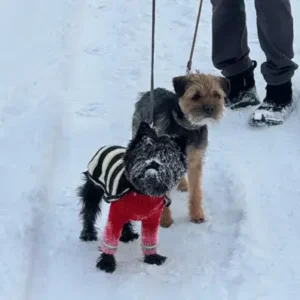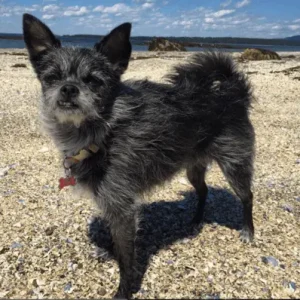Bolognese Dog Origin
The Bolognese is an ancient Bichon frise type breed that originated in Italy and was highly valued from as early as the 11th and 12th centuries. Known for its beauty, grace, and charm, it was frequently given as a gift to nobility and leaders.
During the Renaissance, the breed was a favorite among the elite, with King Umberto of Italy presenting a Bolognese to Princess Jose of Belgium on her birthday. In 1668, Cosimo de Medici sent eight Bolognese to Brussels, where they were gifted to wealthy and influential families.
The Bolognese, like the BoShih, is a small, affectionate breed with a similar temperament, an excellent choice for those seeking a loving companion. Despite its noble heritage, the Bolognese nearly went extinct as the era of nobility faded. However, the breed was revitalized by Gian Franco Giannelli in Italy, who helped restore its popularity.
This purebred was introduced to England by Liz Stannard in 1990 and made its show debut at Crufts in 2002. Officially recognized by the United Kennel Club on January 1, 1995, the Bolognese continues to captivate with its enduring charm.
Bolognese Dog Personality
The Bolognese is one of the dog breeds that is joyful, playful, and affectionate companion who thrives on spending time with their owner. They are well-suited as family pets or as loving companions for elderly individuals. This breed adores children but should always be supervised during interactions, as children’s rough play could potentially hurt the dog or provoke a bite.
- Bolognese Dog Temperament
The Bolognese dog has a sweet and easygoing temperament, often seeking to stay close to its owners. They are intelligent and curious, but not overly energetic, making them perfect for relaxed households.
- Potential Challenges
While the Bolognese are friendly and loving, they do require proper socialization and obedience training to ensure they are well-adjusted and responsive to commands. Supervision is necessary during play with children to prevent accidental injury or defensive behavior. Although not prone to excessive barking, their vocalizations can be surprising given their size. Regular training and socialization are key to a happy and harmonious relationship with this breed.
Bolognese Dog Physical Appearance
The Bolognese is a sturdy, small dog with a lively and intelligent demeanor. This breed features a square, muscular build with a medium-length head. Despite their compact size, they possess strong jaws, white, well-aligned teeth, and a distinctive black nose. Their large, round eyes exude curiosity, and the rims of their eyelids are black.
- Bolognese Dog Size
The Bolognese breed typically stands between 10 and 12 inches tall at the shoulder. Weighing in at 6 to 10 pounds, this breed is compact yet sturdy, with a robust build and small stature showing it is a toy dog breed.
- Coat color
The Bolognese dog breed is distinguished by its striking all-white coat, which is one of its most notable features. This coat is long, soft, and has a fluffy, cotton–like texture, giving the dog a cloud-like appearance. Due to its length and fullness, the coat can sometimes be so thick that it nearly hides the dog’s eyes from view.
- White Bolognese dog- Source: AKC.org
Bolognese Dog Gender Differences
Male and female Bolognese dogs are quite similar, with only minor size differences that are generally not noticeable. Males might be slightly larger, but this difference is subtle. There are no significant temperament differences between the genders. However, unspayed or unneutered dogs may show some behavioral variations.
Bolognese Dog Feed/Nutrition
To keep your Bolognese healthy and vibrant, start with 1 cup of daily food. Given their relatively low energy levels, they don’t need as much food as more active breeds. It’s crucial to offer a balanced diet to avoid overfeeding, which can lead to obesity—a common issue with this breed.
Choose high-quality dog food that lists a premium protein source as the main ingredient and is free of fillers, artificial additives, and excessive grains. Bananas and apples can also be healthy, low-calorie treats for your dog when given in moderation—just be sure to remove any seeds or pits. For personalized advice, consult your veterinarian to adjust the portion size based on your dog’s age, size, and activity level.
Bolognese Dog Health Issues
The Bolognese dog is generally a healthy breed, but like all dogs, they can be prone to certain health issues. Potential Bolognese owners need to understand these health concerns and work with responsible breeders who prioritize the well-being of their dogs. Here’s a look at some common health issues specific to the Bolognese breed, along with explanations and preventive measures:
- Patellar Luxation: Bolognese dogs can experience patellar luxation, where the kneecap dislocates from its normal position. This condition can cause discomfort and difficulty walking. To prevent or manage this, ensure your Bolognese maintains a healthy weight and schedule regular veterinary check-ups to monitor joint health.
- Progressive Retinal Atrophy: PRA is a genetic condition affecting Bolognese dogs, leading to gradual vision loss due to retinal degeneration. While there is no cure, choosing a reputable breeder who tests for genetic conditions and having regular eye exams can help manage and monitor the condition.
- Cataracts: Cataracts, which cause the eye’s lens to become cloudy, can affect Bolognese dogs, leading to impaired vision. Regular eye check-ups with a vet can help catch cataracts early, and timely intervention or surgery can help preserve vision.
- Hip Dysplasia: Though less common in Bolognese dogs, hip dysplasia can still occur, causing discomfort and mobility issues due to a poorly fitting hip joint. To reduce the risk, select a breeder who tests for hip dysplasia and keep your Bolognese at a healthy weight with balanced exercise.
- Legg-Calve-Perthes Disease: This condition involves the deterioration of the femoral head in the hip joint, leading to pain and difficulty moving. Early detection is crucial, and treatment options such as surgery can significantly improve the quality of life for Bolognese dogs affected by this disease.
By being aware of these potential issues and working closely with a knowledgeable veterinarian, you can help ensure that your Bolognese remains happy and healthy.
Bolognese Dog Grooming
Bolognese dogs need consistent care to stay healthy and happy. Their long, cotton-like coat requires daily brushing to avoid matting and tangling, with occasional professional grooming to maintain its quality. Regularly clean their eyes to prevent tear stains.
While not overly energetic, they benefit from daily exercise through short walks, indoor play, and interactive toys to keep them fit and mentally engaged. Their intelligence makes them responsive to positive reinforcement training, which helps reinforce good behavior.
Though hypoallergenic and low-shedding, their coat needs regular grooming to look their best. Finally, Bolognese dogs thrive on affection and companionship, so spend quality time with them to support their emotional well-being.
Incorporating dog training tips, like rewarding good behavior and making sessions fun, can strengthen your bond and help them learn important commands.
Bolognese Dog Rescue Groups
Several dedicated rescue groups are focused on finding loving homes for Bolognese dogs in need. These organizations offer support and guidance through the adoption process, ensuring that each dog finds a suitable and caring environment. Adopting from a rescue group not only provides a second chance for a Bolognese but also helps support the breed’s continued welfare and preservation.
Bolognese Dog Price
The price of a Bolognese dog typically ranges from $1,000 to $2,500, depending on factors such as breeder reputation, pedigree, and location.
If you’re looking to purchase a Bolognese, it’s important to choose a reputable breeder who prioritizes the health and well-being of their dogs. Ensure the breeder provides health clearances for the puppies and allows you to visit their facilities.
Interesting Facts
- Queen Maria Theresa of Austria, mother of Marie Antoinette, was so fond of her Bolognese dog that after its death, she had it preserved by a taxidermist. The mounted dog can still be viewed at the National Museum of History in Vienna.
- Queen Maria Theresa of Austria – Source: americanbologneseclub
Best For
The Bolognese is best suited for individuals or families looking for a calm, affectionate companion. Their low-energy nature makes them ideal for older adults or those with a more relaxed lifestyle, while their loyalty and playful personality also make them great pets for small families. They thrive in homes where they receive plenty of attention and companionship.
Top Names
| Male Bolognese Dog Names | Female Bolognese Dog Names |
| Leo | Bella |
| Milo | Luna |
| Bruno | Daisy |
| Oliver | Sophie |
| Max | Rosie |





















